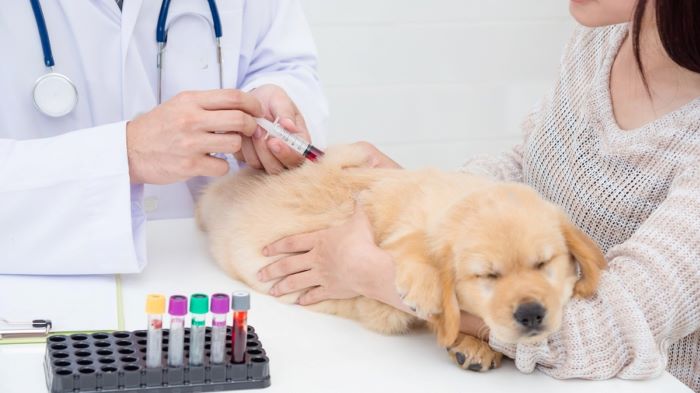Dogs are loyal companions and important members of many families around the world. They bring utter joy and companionship to our lives and as pet owners, it is important to keep them healthy and well cared for. One way to ensure your dog’s health is to have regular blood tests done. Blood tests can certainly help detect and diagnose a range of health conditions in dogs, from infections or illnesses to cancer.
However, one common concern among pet owners is the cost of these tests. In this article, we will explore how much a blood test for a dog in the UK typically costs.
How Much Does a Blood Test Cost for a Dog?

The cost of a blood test for a dog in the UK can vary depending on several factors. One of the most significant factors is the specific test required. There are many different types of blood tests available, and some are more expensive than others. For example, a basic blood test that checks for common health issues such as liver and kidney function can cost between £50 to £100. However, according to What Price, a thyroid blood test would cost around £85. More advanced tests that look for specific conditions related to thyroid functioning can cost up to £220.
Factors Affecting the Cost of Blood Tests

Following are some of the factors which can affect the cost of blood tests for dogs:
Type of test:
The cost of a blood test for a dog can vary depending on the type of test being performed. Basic blood tests such as complete blood count (CBC) and serum chemistry panel are typically less expensive than more specialized tests such as thyroid function tests or infectious disease testing.
Laboratory fees:
The fees charged by the laboratory that performs the blood test can vary depending on the location and type of laboratory. Some veterinary clinics have in-house laboratories which may be more cost-effective than sending samples to an external lab.
Geographic location:
The cost of veterinary care and services can vary depending on the geographic location. Generally, veterinary services in urban areas tend to be more expensive than in rural areas.
Age and health status of the dog:
Older or sick dogs may require additional testing or monitoring, which can increase the cost of the blood test.
Blood Tests for Dogs That Target Particular Organs
Following are some of the blood tests for dogs that are specialized to assess the condition of particular organs:
Thyroid test:
- Total T4
- Free T4
- Total T3
- Free T3
- Canine Thyroglobulin
Liver test:
- Alanine Aminotransferase (ALT)
- Aspartate Aminotransferase (AST)
- Alkaline Phosphatase (ALP)
- Gamma Glutamyl Transferase (GGT)
- Bilirubin (total and direct)
- Total Protein
- Albumin
- Globulin
- A:G ratio
- Cholesterol
Kidney test:
- Blood Urea Nitrogen (BUN)
- Creatinine
Muscle and Bone test:
- Calcium and phosphorous (bone)
- Creatine Kinase (CK or CPK)
- Aspartate Aminotransferase (AST) muscle damage, trauma, or inflammation
- Electrolytes
Pancreas test:
- Glucose
- Amylase
- Lipase
- Cholesterol
- Triglycerides
How Often Should a Blood Test Be Done?
The usual interval for dogs to undergo blood work can vary depending on factors such as their age, health status, and medical history. In general, however, it is recommended that healthy adult dogs undergo blood testing at least once a year, while senior dogs or those with preexisting medical conditions may need more frequent testing.
Only when your veterinarian suggests it does your dog require blood work done. If you’ve noticed a change in your dog’s behaviour or health, your veterinarian might advise blood work. For instance, your veterinarian might want to perform some blood tests if your dog abruptly stops eating or experiences frequent episodes of vomiting.
Whatever tests your veterinarian deems essential to determine the source of your beloved dog’s discomfort will be performed.
Limitations of Blood Tests
Do blood tests actually justify the cost? The majority of blood chemistry tests assess a cell type’s or organ’s performance. Typically, they cannot pinpoint the precise reason for an unexpected test result. However, they rarely identify a particular cause for your dog’s illness or condition.
In some cases, blood tests may need to be repeated over time to monitor a dog’s health and track changes in its condition.
Blood test results need to be interpreted by a trained veterinarian, who can analyze the results in the context of a dog’s overall health and medical history. Thereby, increase in total costs, as veterinarians will also charge consultation charges.
FAQs
What does a blood test show in dogs?
Blood tests give the veterinarian information about your dog’s hydration status, anaemia, infection, blood clotting ability, and immune system response. According to this, the veterinarian can prescribe medicines.
Do they sedate dogs for blood tests?
Not at all. The vast majority of dogs do not need any type of anaesthesia or sedation during blood tests. Dogs tolerate this very well and it can be done without any sedation.
Do blood tests hurt dogs?
No, usually dogs do not feel any pain. However, some dogs may experience mild discomfort or pain during the blood draw, while others may be more sensitive and experience more significant discomfort.
Average dog thyroid test cost?
The cost of testing a dog’s thyroid can fall anywhere between £40 and £140 on average.
Are dog blood tests accurate?
Yes, dog blood tests can be accurate in detecting various health conditions and diseases. Blood tests are a common diagnostic tool used by veterinarians to evaluate a dog’s overall health and identify any underlying health issues.
Conclusion
I hope through this article we’ve answered the how much a blood test for a dog in the UK typically costs question. In conclusion, the cost of a blood test for a dog in the UK can vary depending on several factors, including the type of test required, the veterinary clinic or laboratory performing the test, and the location.
Pet owners should discuss all potential costs with their veterinarian before proceeding with any tests and consider pet insurance to help cover the cost. Ultimately, the cost of a blood test is a small price to pay for the health and well-being of our beloved furry companions.
References:
- Animal Trust Limited. (2020, December 7). Pet Veterinary Blood Tests | Animal Trust Not for Profit Vets. Animal Trust. Retrieved February 24, 2024, from https://www.animaltrust.org.uk/our-services/pet-blood-tests/
- Canine Laboratory Tests For Veterinary Care. (2019, June 12). Countryside Veterinary Clinic. Retrieved February 24, 2024, from https://www.countrysideveterinaryclinic.org/services/dogs/laboratory-blood-tests
- A. (2020, December 22). What do Blood Tests Tell Your Veterinarian? The Animal Medical Center. Retrieved February 24, 2024, from https://www.amcny.org/blog/2014/12/18/what-do-blood-tests-tell-your-veterinarian/



